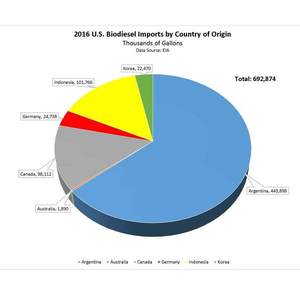US biodiesel group seeks duties on Argentine, Indonesian imports

Source: EIA Data Graphically Compiled by Ron Kotrba, Biodiesel Magazine
March 23, 2017
BY The National Biodiesel Board
The National Biodiesel Board filed an antidumping and countervailing duty petition March 23, making the case that Argentine and Indonesian companies are violating trade laws by flooding the U.S. market with dumped and subsidized biodiesel. The petition was filed with the U.S. Department of Commerce and the U.S. International Trade Commission on behalf of the NBB Fair Trade Coalition, which is made up of the NBB and U.S. biodiesel producers.
“The National Biodiesel Board and U.S. biodiesel industry is committed to fair trade, and we support the right of producers and workers to compete on a level playing field,” said Donnell Rehagen, CEO of the NBB. “This is a simple case where companies in Argentina and Indonesia are getting advantages that cheat U.S. trade laws and are counter to fair competition. NBB is involved because U.S. biodiesel production, which currently support more than 50,000 American jobs, is being put at risk by unfair market practices.”
Because of illegal trade activities, biodiesel imports from Argentina and Indonesia surged by 464 percent from 2014 to 2016. That growth has taken 18.3 percentage points of market share from U.S. manufacturers.
“The resulting imbalance caused by unfair trade practices is suffocating U.S. biodiesel producers,” Rehagen explained. “Our goal is to create a level playing field to give markets, consumers and retailers access to the benefits of true and fair competition.”
Advertisement
Based on NBB’s review, Argentine and Indonesian producers are dumping their biodiesel in the U.S. by selling at prices that are substantially below their costs of production. This is reflected in the petition’s alleged dumping margins of 23.3 percent for Argentina and 34 percent for Indonesia. The petition also alleges illegal subsidies based on numerous government programs in those countries.
This is not the first time that Argentine and Indonesian biodiesel producers have been charged with violating international trade laws. In 2013, the EU imposed 41.9 to 49.2 percent duties on Argentina and 8.8 to 23.3 percent duties on Indonesia. Just last year, Peru imposed both antidumping and countervailing duties on Argentine biodiesel.
Advertisement
Related Stories
California’s new specified source feedstock attestation requirement: A critical new compliance step for renewable fuel producers
As of July 2025, California’s SCFS requires renewable fuel producers using specified source feedstocks to secure attestation letters reaching back to the point of origin. This marks a significant shift in compliance expectations.
The public comment period on the U.S. EPA’s proposed rule to set 2026 and 2027 RFS RVOs and revise RFS regulations closed Aug. 8. Biofuel groups have largely expressed support for the proposal but also outlined several ways to improve the rulemaking.
The U.S. renewable fuels industry on Aug. 8 celebrated the 20th anniversary of the Renewable Fuel Standard. Federal lawmakers also marked the occasion with resolutions introduced in the House and Senate earlier this month.
Iowa farmers have a new market opportunity for their 2025 soybean crop. Landus is expanding its Clean Fuel Regulation initiative, made possible by recent policy changes expected to increase Canada's demand for liquid biofuel.
Klobuchar, Moran introduce bipartisan legislation to support biorefineries, renewable chemicals, and biomanufacturing
Sens. Amy Klobuchar, D-Minn., and Jerry Moran, R-Kan., on July 31 announced the introduction of the Ag BIO Act. The legislation aims to update the USDA’s loan guarantee program to better support biorefining projects.
Upcoming Events










